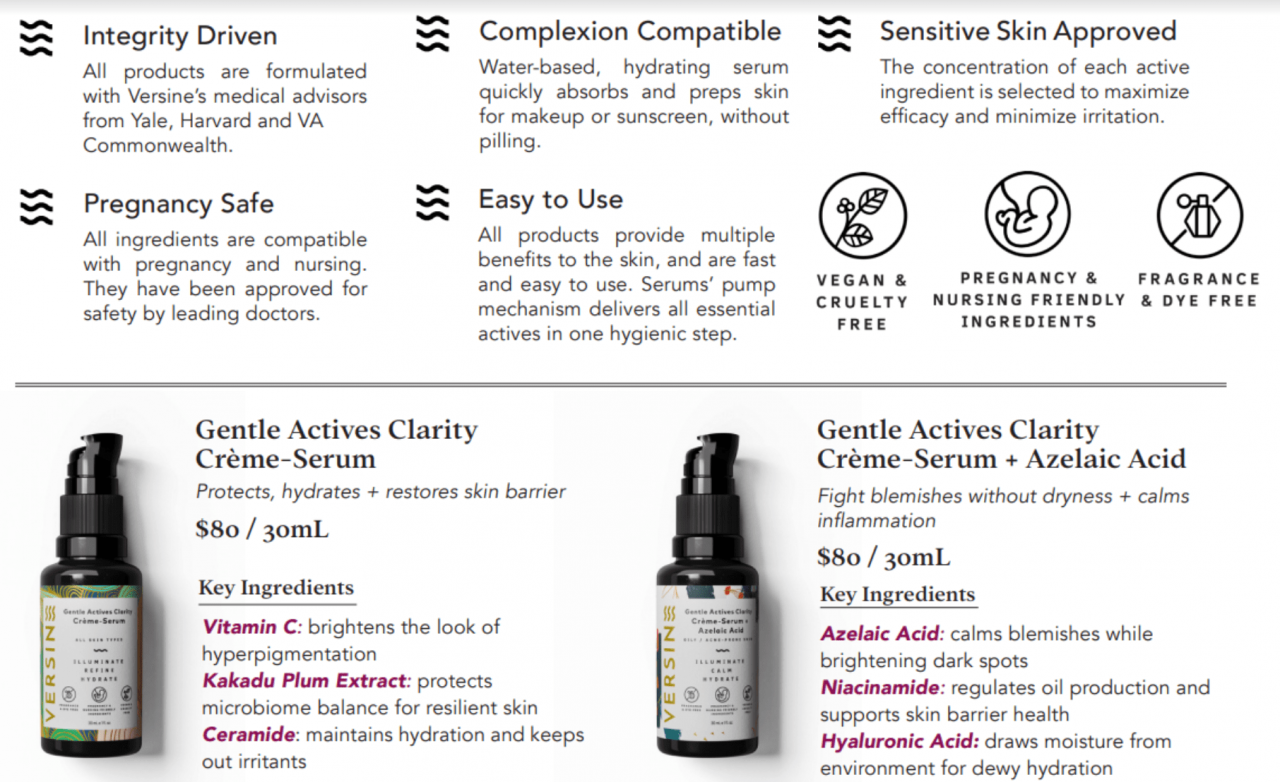Skincare fan – Calling all skincare enthusiasts! Embark on a captivating journey into the world of skincare, where every ingredient holds a promise of transformation. Join us as we delve into the science behind skincare, empowering you to create a personalized regimen that will unlock your skin’s true potential.
From understanding the needs of different skin types to mastering the art of DIY skincare, we’ve got you covered. Discover the latest trends and innovations, and learn how to maintain a healthy skin barrier that will keep your complexion glowing.
Popular Skincare Ingredients for Different Skin Types
Understanding your skin type and concerns is crucial for selecting the most effective skincare ingredients. Here’s a comprehensive guide to popular skincare ingredients tailored to specific skin types and their benefits:
Hyaluronic Acid
Hyaluronic acid is a humectant that attracts and retains moisture, making it ideal for dry and dehydrated skin. It helps improve skin elasticity, reduce fine lines, and enhance overall skin health.
Ceramides
Ceramides are lipids that strengthen the skin’s barrier, preventing moisture loss and protecting against environmental aggressors. They are beneficial for all skin types, particularly those with sensitive or compromised skin.
Niacinamide
Niacinamide, also known as vitamin B3, has anti-inflammatory properties that soothe and calm irritated skin. It helps regulate sebum production, making it suitable for acne-prone skin. It also improves skin tone and reduces hyperpigmentation.
Retinol
Retinol, a derivative of vitamin A, promotes cell turnover, stimulates collagen production, and reduces fine lines and wrinkles. It is effective for aging skin and acne-prone skin, but should be used with caution as it can cause irritation.
| Skin Type | Concerns | Recommended Ingredients | Product Examples |
|---|---|---|---|
| Dry | Dehydration, fine lines | Hyaluronic acid, ceramides | CeraVe Hydrating Cleanser, Neutrogena Hydro Boost Water Gel |
| Sensitive | Irritation, redness | Ceramides, niacinamide | La Roche-Posay Toleriane Double Repair Face Moisturizer, CeraVe Facial Moisturizing Lotion |
| Acne-prone | Blemishes, excess sebum | Niacinamide, retinol | Paula’s Choice 2% BHA Liquid Exfoliant, Differin Gel |
| Aging | Fine lines, wrinkles | Retinol, hyaluronic acid | Olay Regenerist Retinol 24 Night Serum, The Ordinary Hyaluronic Acid 2% + B5 |
Skincare Routines for Specific Skin Concerns: Skincare Fan
Every skin type has its own unique set of concerns, and it’s important to tailor your skincare routine to address those concerns. Here are some common skin concerns and tailored skincare routines for each:
Acne
Acne is a common skin condition that can be caused by a variety of factors, including hormones, bacteria, and clogged pores. To treat acne, it’s important to use products that will help to cleanse the skin, reduce inflammation, and prevent future breakouts.
-
-*Cleanser
A gentle cleanser that will not irritate the skin is important. Look for cleansers that contain salicylic acid or benzoyl peroxide, which are both effective at fighting acne-causing bacteria.
-*Moisturizer
It is important to use a moisturizer to keep the skin hydrated, even if you have acne. Look for moisturizers that are oil-free and non-comedogenic, which means they will not clog pores.
-*Treatment
There are a variety of over-the-counter and prescription treatments available for acne. Some common treatments include retinoids, antibiotics, and hormonal therapy.
Dryness
Dry skin is a common skin condition that can be caused by a variety of factors, including genetics, climate, and certain medical conditions. To treat dry skin, it’s important to use products that will help to hydrate the skin and prevent moisture loss.
-
-*Cleanser
A gentle cleanser that will not strip the skin of its natural oils is important. Look for cleansers that contain humectants, such as glycerin or hyaluronic acid, which help to attract and retain moisture.
-*Moisturizer
It is important to use a moisturizer that will help to seal in moisture and prevent it from evaporating. Look for moisturizers that are thick and creamy, and contain ingredients such as ceramides or shea butter.
-*Treatment
There are a variety of over-the-counter and prescription treatments available for dry skin. Some common treatments include emollients, humectants, and occlusives.
Aging
Aging is a natural process that can cause the skin to lose its elasticity, firmness, and radiance. To treat aging skin, it’s important to use products that will help to stimulate collagen production, reduce wrinkles, and improve the skin’s overall appearance.
-
-*Cleanser
A gentle cleanser that will not irritate the skin is important. Look for cleansers that contain antioxidants, such as vitamin C or green tea extract, which help to protect the skin from damage.
-*Moisturizer
It is important to use a moisturizer that will help to hydrate the skin and prevent moisture loss. Look for moisturizers that are rich in antioxidants and contain ingredients such as retinol or peptides, which help to stimulate collagen production.
-*Treatment
There are a variety of over-the-counter and prescription treatments available for aging skin. Some common treatments include retinoids, antioxidants, and growth factors.
DIY Skincare Recipes Using Natural Ingredients
Harnessing the power of nature, homemade skincare recipes offer a plethora of benefits for various skin types. Utilizing ingredients such as honey, aloe vera, and avocado, these recipes provide a gentle yet effective approach to skincare.
Elevate your skincare routine with skincare accessories that enhance every step. From the iconic pink skincare headband that keeps your hair away to the luxurious Retrouve skincare tools that massage and rejuvenate your skin, there’s a perfect accessory for every need.
Plus, discover free skincare samples to try before you buy, ensuring you find the perfect products for your skin.
Simple and Effective DIY Skincare Recipes
Discover a selection of easy-to-follow recipes tailored to specific skin concerns, presented in a comprehensive table format.
| Ingredients | Instructions | Benefits |
|---|---|---|
| 1/2 cup honey, 1/4 cup plain yogurt, 1 tablespoon lemon juice | Combine ingredients and apply as a face mask for 15 minutes. Rinse with warm water. | Moisturizes, brightens, and exfoliates |
| 1/2 cup aloe vera gel, 1/4 cup cucumber juice, 1 tablespoon green tea | Blend ingredients and apply as a face mask for 20 minutes. Rinse with cool water. | Soothes, hydrates, and reduces inflammation |
| 1/2 ripe avocado, 1 tablespoon olive oil, 1 teaspoon honey | Mash avocado and combine with other ingredients. Apply as a face mask for 15 minutes. Rinse with warm water. | Nourishes, moisturizes, and protects |
Skincare Trends and Innovations
The skincare industry is constantly evolving, with new trends and innovations emerging all the time. Some of the most notable trends in recent years include the use of probiotics, personalized skincare, and sustainable packaging.
Pamper your skin with the finest skincare accessories for an indulgent skincare routine. Treat yourself to the luxurious Retrouve skincare line, renowned for its age-defying formulas. Don’t miss out on free skincare samples to discover your perfect skincare match. Enhance your skincare experience with a chic pink skincare headband , keeping your hair away from your precious products.
Probiotics are live bacteria that are beneficial to the skin. They can help to improve the skin’s microbiome, which is the community of bacteria that lives on the skin. A healthy microbiome can help to protect the skin from infection and inflammation.
Probiotics can be found in a variety of skincare products, including cleansers, moisturizers, and masks.
Personalized skincare is another growing trend. This involves tailoring skincare products to the individual’s specific skin type and needs. Personalized skincare products can be created using a variety of methods, including online quizzes, skin consultations, and DNA testing.
Sustainable packaging is becoming increasingly important to consumers. Many skincare brands are now using recyclable and biodegradable packaging materials. Some brands are also using refillable packaging, which allows consumers to reuse the same container over and over again.
Innovative Skincare Products and Technologies
In addition to these trends, there are a number of innovative skincare products and technologies that have been developed in recent years. These products and technologies offer a variety of benefits, including improved efficacy, convenience, and safety.
- LED light therapy: LED light therapy uses different wavelengths of light to treat a variety of skin concerns, including acne, wrinkles, and sun damage. LED light therapy is a safe and effective treatment that can be used at home or in a professional setting.
- Microneedling: Microneedling is a minimally invasive procedure that involves using tiny needles to create micro-injuries in the skin. These micro-injuries stimulate the skin’s natural healing process, which can lead to improved collagen production and reduced wrinkles.
- Radiofrequency therapy: Radiofrequency therapy uses radio waves to heat the skin’s deeper layers. This heat can help to tighten the skin, reduce wrinkles, and improve circulation.
- Cryotherapy: Cryotherapy is a treatment that uses cold temperatures to reduce inflammation and pain. Cryotherapy can be used to treat a variety of skin conditions, including acne, eczema, and psoriasis.
Tips for Maintaining a Healthy Skin Barrier
Our skin barrier, the outermost layer of our skin, acts as a protective shield against external aggressors like bacteria, pollution, and UV rays. Maintaining a healthy skin barrier is essential for overall skin health and preventing common skin concerns like dryness, irritation, and inflammation.
Here are some key tips to help you maintain a healthy skin barrier:
Avoid Harsh Cleansers
Harsh cleansers can strip away the skin’s natural oils, weakening the skin barrier. Opt for gentle, pH-balanced cleansers that cleanse without over-drying.
Use Sunscreen
UV rays from the sun can damage the skin barrier, leading to dryness, wrinkles, and even skin cancer. Apply sunscreen with an SPF of 30 or higher daily, even on cloudy days.
Incorporate Ceramides into Your Routine, Skincare fan
Ceramides are lipids that help strengthen the skin barrier. Look for skincare products that contain ceramides to help repair and protect your skin.
Final Thoughts
As you embark on this skincare adventure, remember that every step is an investment in your skin’s future. Embrace the knowledge, experiment with new products, and indulge in the transformative power of skincare. Your radiant skin awaits!
Helpful Answers
What are the key ingredients for a healthy skin barrier?
Ceramides, fatty acids, and cholesterol are crucial for maintaining a strong and healthy skin barrier.
How often should I exfoliate my skin?
The frequency of exfoliation depends on your skin type and concerns. Generally, once or twice a week is sufficient.
Can I use natural ingredients in my skincare routine?
Absolutely! Honey, aloe vera, and avocado are excellent natural ingredients with skin-nourishing properties.






Leave a Reply